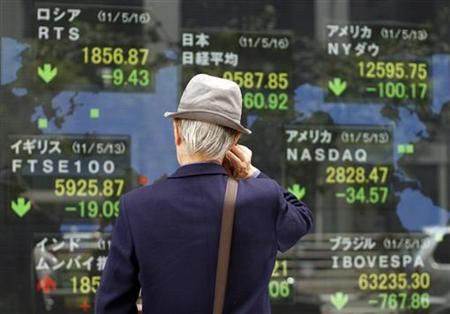Most Asian Markets Drop On Japan Growth Assessment Cut

Most of the Asian markets fell Monday as investor concerns of the weakening global economic condition were revived as Japan's government lowered its assessment of the country's economy.
Japan's Nikkei Stock Average was down 0.28 percent or 25.32 points to 9060.07. Among major losers were Sumco Corp (3.54 percent), Furukawa Co Ltd (2.82 percent) and Tosoh Corp (2.79 percent).
The Chinese Shanghai Composite marginally rose 0.02 percent or 0.36 points to 2056.06. Hong Kong's Hang Seng was down 0.11 percent or 22.72 points to 19775.95. Among major losers were COSCO Pacific Ltd (2.30 percent) and Citic Pacific Ltd (1.82 percent).
South Korea's KOSPI Composite Index dropped 0.29 percent or 5.53 points to 1912.34. Shares of Samsung Electronics Co Ltd rose 1.53 percent and those of Hyundai Motor Co fell 2.02 percent.
India's BSE Sensex rose 0.04 percent or 7.67 points to 17686.48. Among major gainers were Cipla (0.73 percent), Tata Steel (0.65 percent) and Axis Bank Ltd (0.30 percent).
Market sentiment turned negative as the Cabinet Office in Tokyo stated in its monthly report released Tuesday that the government was downgrading its assessment of Japan's economy.
Earlier this month, it was reported that Japan's economic growth slowed down in the April-June quarter compared to the first three months of the year, indicating that the country was losing the growth momentum affected by the soft global demand and weak consumer spending. Japan's economy grew at 0.3 percent in the second quarter, down from 1.2 percent in the first three months of the year.
Last week, Japan reported a rise in trade deficit in July compared to the previous month with a decrease in exports and an increase in imports, raising concerns of the global economic condition. The Finance Ministry data showed that the country recorded 517.4 billion yen ($6.5 billion) trade deficit in July, down from 60.3 billion yen surplus in June. While exports dropped 8.1 percent to 5.31 trillion yen from a year earlier indicating the soft global demand, imports rose 2.1 percent to 5.83 trillion yen as the nuclear energy crisis has resulted in the increased need of oil and gas.
Investors feel that the Bank of Japan would need to urgently expand its asset purchase program (APP) with Japan's economy having lost its growth momentum faced with deflation and the strengthening of the yen.
© Copyright IBTimes 2024. All rights reserved.





















